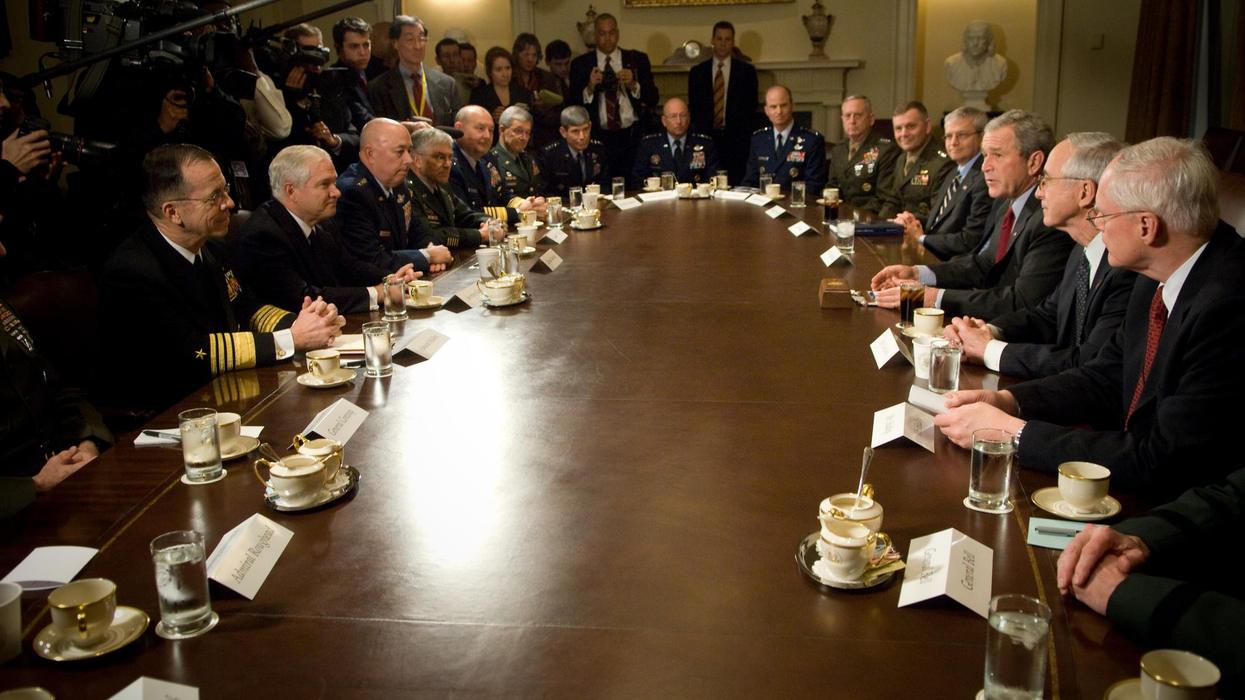Remember the old line, “What if they had a war and nobody came?” That’s increasingly how the 2024 Republican presidential primary is shaping up.
When former New Jersey Gov. Chris Christie traveled to Ukraine to show his solidarity with the government in Kyiv against the Russian invasion, it was also intended to send a shot across former President Donald Trump’s bow.
Christie wanted to remind every Republican skeptic of an open-ended commitment to Ukraine in its war with nuclear-armed Russia — from Trump to Florida Gov. Ron DeSantis and entrepreneur Vivek Ramaswamy — who’s really boss in the GOP more than three decades after the curtain came down on the Cold War.
“I cannot understand what Governor DeSantis’s position is on Ukraine,” Christie told the Washington Post afterward. “Vivek is Trump’s wingman. There’s no substance to what Vivek Ramaswamy is saying on this issue.”
Yet a look at the RealClearPolitics polling average shows the three Ukraine-skeptical candidates are together drawing 77.6 percent of the vote. Christie is winning 3.1 percent, a 74.5-point gap. To be generous we can throw in former Vice President Mike Pence and former United Nations Ambassador Nikki Haley, who hold the same position on U.S. involvement in the war. Sen. Tim Scott, the South Carolina Republican, is in substantial agreement with this bloc of candidates.
That’s 13.7 percent of the vote for the four of them combined. None of the other candidates tops 1 percent of the vote. It calls to mind Pat Buchanan’s 1996 quip about his GOP primary opponent Arlen Specter, that, given the margin of error, the Pennsylvania Republican might not even exist.
When the debate takes place on Wednesday night, DeSantis and Ramaswamy will be at the center stage because of their polling status. At the same time on X (formerly Twitter) the missing frontrunner, Donald Trump, a touch under 56 percent in the latest averages, will be seen in a pre-recorded interview with the conservative media personality who is perhaps most critical of current Ukraine policy, Tucker Carlson.
Christie does have a meaningful pocket of support in New Hampshire. But that appears to have more to do with blue state moderate Republicanism than foreign policy hawkishness.
The stature gap between the candidates isn’t the only indication the maximalist hawkish line on the conflict is no longer selling. Even before the debate starts, the Heritage Foundation will be rolling out an ad opposing President Joe Biden’s latest Ukraine spending push. That’s a much larger and more venerable conservative think tank than the Bill Kristol-led outfit pushing in the opposite direction.
Then there is mounting evidence that rank-and-file Republican voters are souring on Ukraine-related spending, in a time of domestic problems and an “America First” emphasis by many ascendant conservatives. When an August CNN poll found that a 55 percent majority of Americans did not want Congress to authorize new Ukraine aid, an Atlantic Council blogger tried to spin it away with this riposte to “isolationist commentators”:
“After eighteen months of the Russian war on Ukraine and tens of billions of dollars in US support to Kyiv, nearly half of Americans want Congress to spend more money to help Ukraine defend its sovereignty and freedom.” (Emphasis in the original.)....
...While US public support for military aid to Ukraine has fallen since February 2022, the sky is certainly not falling. The picture of US support is far more complex than the cheerleaders for ending US support to Ukraine might want to believe.
Another argument that remains in heavy circulation among Republican hawks is that aiding Ukraine degrades the Russian military at a cheaper cost than boosting our own defense budget against future threats from the Kremlin. This is undoubtedly reassuring the growing number of Ukrainians dying and losing limbs on the battlefield today.
So the intra-party debate isn’t over, exactly. Nor is a lot of the Republican criticism of Biden on Ukraine entirely sophisticated. Some of it is undoubtedly partisan and opportunistic. But it is a lot harder to pull an “Unpatriotic Conservatives” card on Ukraine when Trump is the frontrunner and Bill Kristol and David Frum are effectively Democratic operatives and Resistance bloggers.
Quite a lot has changed in Republican foreign policy discourse in the last 20 years. Whether that will translate into lasting changes in how Republicans actually govern remains to be seen. But at least the neoconservative monologue has been turned into a broader conservative debate, one that has reached as far as the 2024 GOP presidential candidates.

















